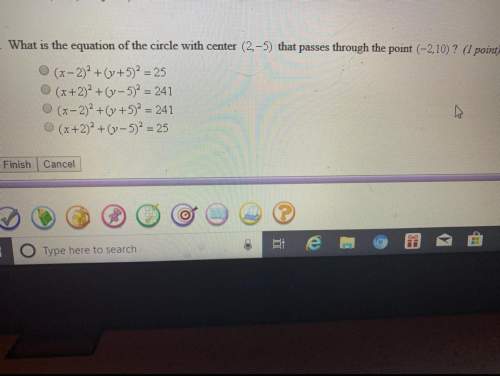Doug bought a new car for 25,
000. he estimates his car will depreciate, or lose of value, at...

Mathematics, 19.12.2019 08:31 Karamatullah
Doug bought a new car for 25,
000. he estimates his car will depreciate, or lose of value, at a rate of 20% per year. the value of his car is molded by the equation v=p(1-r)^t, where v is the value of the car, p is the price paid, r is the annual rate of depreciation, and t is the number of years he had owned the car. according to the model, what will be the approximate value of his car after 4 1/2 years?

Answers: 2


Other questions on the subject: Mathematics

Mathematics, 21.06.2019 21:30, lraesingleton
Acompany charges $0.10 for each letter engraved. bobby plans to spend no more than $5.00 on the engraving on a jewelry box. write and solve an inequality to find the maximum number of letters he can have engraved.
Answers: 1

Mathematics, 21.06.2019 22:00, jessejames48
The coordinates r(1, -3), s(3, -1) t(5, -7) form what type of polygon? a right triangle an acute triangle an equilateral triangle an obtuse triangle
Answers: 1

Mathematics, 22.06.2019 00:30, bercishicicorbin
$5400 is? invested, part of it at 11? % and part of it at 8? %. for a certain? year, the total yield is ? $522.00. how much was invested at each? rate?
Answers: 1

Mathematics, 22.06.2019 02:00, fespinoza019
The null and alternate hypotheses are: h0: μ1 ≤ μ2 h1: μ1 > μ2 a random sample of 22 items from the first population showed a mean of 113 and a standard deviation of 12. a sample of 16 items for the second population showed a mean of 99 and a standard deviation of 6. use the 0.01 significant level. find the degrees of freedom for unequal variance test. (round down your answer to the nearest whole number.) state the decision rule for 0.010 significance level. (round your answer to 3 decimal places.) compute the value of the test statistic. (round your answer to 3 decimal places.) what is your decision regarding the null hypothesis? use the 0.01 significance level.
Answers: 1
You know the right answer?
Questions in other subjects:


Chemistry, 23.10.2019 22:00



Biology, 23.10.2019 22:00

Mathematics, 23.10.2019 22:00







